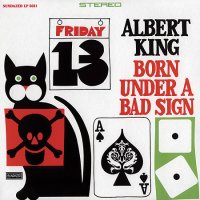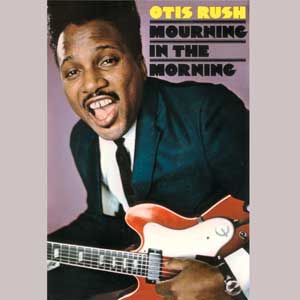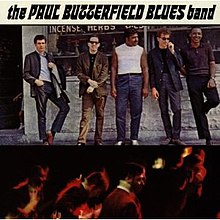
The Doors is the debut studio album by the American rock band the Doors, released on January 4, 1967, by Elektra Records. It was recorded in August and September 1966 at Sunset Sound Recorders, in Hollywood, California, under the production of Paul A. Rothchild. The album features the extended version of the band's breakthrough single "Light My Fire" and the lengthy closer "The End" with its Oedipal spoken word section. Various publications, including BBC and Rolling Stone, have listed The Doors as one of the greatest debut albums of all time.

Paul Vaughn Butterfield was an American blues harmonica player, singer, and bandleader. After early training as a classical flautist, he developed an interest in blues harmonica. He explored the blues scene in his native Chicago, where he met Muddy Waters and other blues greats, who provided encouragement and opportunities for him to join in jam sessions. He soon began performing with fellow blues enthusiasts Nick Gravenites and Elvin Bishop.

L.A. Woman is the sixth studio album by the American rock band the Doors, released on April 19, 1971, by Elektra Records. It is the last to feature lead singer Jim Morrison during his lifetime, due to his death exactly two months and two weeks following the album's release, though he would posthumously appear on the 1978 album An American Prayer. Even more so than its predecessors, the album is heavily influenced by blues. It was recorded without producer Paul A. Rothchild after he quit the band over the perceived lack of quality in their studio performances. Subsequently, the band co-produced the album with longtime sound engineer Bruce Botnick.

Michael Bernard Bloomfield was an American blues guitarist and composer. Born in Chicago, he became one of the first popular music stars of the 1960s to earn his reputation almost entirely on his instrumental prowess, as he rarely sang before 1969. Respected for his guitar playing, Bloomfield knew and played with many of Chicago's blues musicians before achieving his own fame and was instrumental in popularizing blues music in the mid-1960s. In 1965, he played on Bob Dylan's Highway 61 Revisited, including the single "Like a Rolling Stone", and performed with Dylan at that year's Newport Folk Festival.
Blues rock is a fusion genre and form of rock music that relies on the chords/scales and instrumental improvisation of blues. It is mostly an electric ensemble-style music with instrumentation similar to electric blues and rock. From its beginnings in the early to mid-1960s, blues rock has gone through several stylistic shifts and along the way it inspired and influenced hard rock, Southern rock, and early heavy metal.
Mark Naftalin is an American blues keyboardist and record producer. He appears on the first five albums by Paul Butterfield Blues Band in the mid 1960s as a band member, and as such was inducted into the Rock and Roll Hall of Fame in 2015. He later worked onstage with the late fellow Butterfield Band member Mike Bloomfield and has been active from his home in Marin County in the San Francisco Bay Area as a festival and radio producer for several decades.

Elvin Richard Bishop is an American blues and rock music singer, guitarist, bandleader, and songwriter. He was inducted into the Rock and Roll Hall of Fame as a member of the Paul Butterfield Blues Band in 2015, and in the Blues Hall of Fame as a solo artist in 2016.

Born Under a Bad Sign is the second compilation album by American blues musician Albert King, released in August 1967 by Stax Records. It features eleven electric blues songs that were recorded from March 1966 to June 1967, throughout five different sessions. King played with two in-house bands: Booker T. & the M.G.'s and the Memphis Horns. Although the album failed to reach any music chart, it did receive positive reviews from music critics and is often cited as one of the greatest blues albums ever made. Born Under a Bad Sign influenced many guitarists, including Eric Clapton, Mike Bloomfield, Jimi Hendrix, and Stevie Ray Vaughan. Born Under a Bad Sign has been recognized by several music institutions, and has been inducted into the Blues Foundation Hall of Fame, the Grammy Hall of Fame, and the National Recording Registry.

East-West is the second album by the American blues rock band the Butterfield Blues Band, released in 1966 on the Elektra label. It peaked at No. 65 on the Billboard pop albums chart, and is regarded as highly influential by rock and blues music historians.

The Resurrection of Pigboy Crabshaw is the third album by the American blues rock band Paul Butterfield Blues Band. Its name refers to Elvin Bishop, whose role shifted to lead guitarist after Mike Bloomfield departed to form the Electric Flag. Released in 1967, the album marked a slight shift in the band's sound towards R&B and was the first Butterfield record to feature a horn section, which included a young David Sanborn on alto saxophone.

Let It Flow is a solo album by rock musician Elvin Bishop. His fourth studio album, it was released in 1974. The album was recorded at Capricorn Studios in Macon, Georgia, several years after he left The Butterfield Blues Band. Guest musicians include Charlie Daniels, Dickey Betts, Toy Caldwell, Vassar Clements, and Sly Stone.

What's Shakin' is a compilation album released by Elektra Records in May 1966. It features the earliest studio recordings by the Lovin' Spoonful and the Paul Butterfield Blues Band, as well as the only released recordings by the ad hoc studio group Eric Clapton and the Powerhouse, until they were reissued years later.

It's Not Killing Me is the debut solo album by American blues guitarist Mike Bloomfield. It was released in 1969 through Columbia Records. Following his success with the Paul Butterfield Blues Band, The Electric Flag, and in the Super Session recordings with Al Kooper, Bloomfield teamed up with former colleagues to record this largely self-written album.
"Mary, Mary" is a song written by Michael Nesmith and first recorded by the Paul Butterfield Blues Band for their 1966 album East-West. Nesmith's band, the Monkees, later recorded it for More of the Monkees (1967). Hip hop group Run–D.M.C. revived the song in the late 1980s, with an adaptation that appeared in the U.S. record charts.

"Look on Yonder Wall" is a blues song first recorded in 1945 by James "Beale Street" Clark. Clark, also known as "Memphis Jimmy", was a blues pianist from Memphis, Tennessee. During the 1940s, he appeared on recordings by Jazz Gillum, Red Nelson, and an early Muddy Waters session, as well as several singles in his own name.

Mourning In the Morning is an album by the American blues singer and guitarist Otis Rush, released in 1969. Though Rush had been cutting singles since 1955, this was his first album. It infuses Rush's deep blues sound with soul and rock. The album was panned by many critics, but has since developed a cult following.

In My Own Dream is the fourth album by the American blues rock band Paul Butterfield Blues Band. Released in 1968, it continued the trend of its predecessor The Resurrection of Pigboy Crabshaw in moving towards a more soul-oriented sound, supported by a first rate horn section,, but was not so well-received either by critics or the public as its predecessor.

Fathers and Sons is the seventh studio album by the American blues musician Muddy Waters, released as a double LP by Chess Records in August 1969.

The Paul Butterfield Blues Band was an American blues and blues-rock band from Chicago. Formed in the summer of 1963, the group originally featured eponymous vocalist and harmonicist Paul Butterfield, guitarist Elvin Bishop, bassist Jerome Arnold, and drummer Sam Lay. The band added guitarist Mike Bloomfield and keyboardist Mark Naftalin before recording their self-titled debut album, which was released in October 1965. The founding sextet were inducted into the Rock and Roll Hall of Fame in 2015, along with Billy Davenport, their drummer on their second album, East-West.

"Born in Chicago" is a blues song written by Nick Gravenites. It was the opening track on the self-titled debut album by the Paul Butterfield Blues Band in 1965 and has since become a blues standard.

















